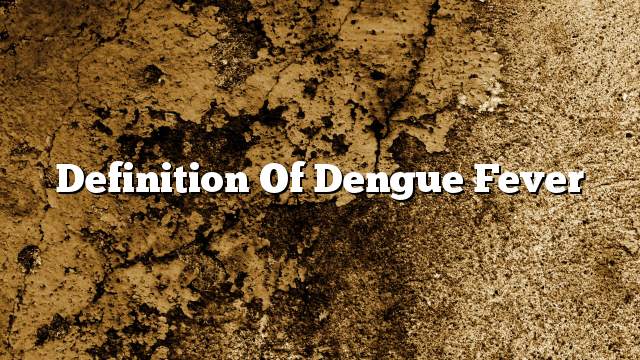Dengue fever
Dengue Fever, also known as dengue fever or dengue fever, is defined as an acute diet disease found in the tropics and is known as broken bone fever, caused by four close serotypes Of the same species of flavivirus belonging to the family of nematode viruses, are spread geographically in northern Argentina, northern Australia, Taiwan, Malaysia, Vietnam, Honduras, Indonesia, India, the Philippines, Costa Rica, Brazil, Mexico, Bangladesh, Tropical regions.
Dengue is transmitted to humans by a mosquito called Aedes aegypti by a mosquito called Aedes albopictus, which is rare and that feeds during the daytime, or through blood products from infected persons to people According to the World Health Organization (WHO), nearly 2.5 billion people are at risk of infection, accounting for about a fifth of the world’s population, and estimates that 50 million people around the world develop dengue every year.
Symptoms and signs of dengue fever
The signs of dengue fever appear within a period of approximately three days to two weeks. Symptoms have two forms:
- Simple: The symptoms are similar to the symptoms of cold in the beginning and are as follows:
- Pain in muscles, joints and back.
- Headache and back pain.
- Vomiting, nausea, loss of appetite and general laziness.
- Increase in temperature.
- Heat and skin rash in case of infection of infants and children.
- The skin rash goes down after the heat, then the heat rises again after two days of decline.
- Skin rash occurs once again in the entire body, feet and hands, and lasts for days and then the temperature decreases.
- Hemorrhagic form: Which is called dengue haemorrhagic fever, which is a complication of dengue fever, which may result in death, and often appear when the person is infected again or the second time of infection with the same virus and the symptoms are as follows:
- Begins with the same symptoms and then develops after (2-5) days, causing shock and sudden bleeding and rapid bleeding spots under the skin.
- High temperature .
- Permanent headaches.
- Loss of appetite and dizziness.
- Bleeding from the mucous membranes, vomiting of blood, bloody diarrhea, and bleeding of the gums.
- Develop into cerebral haemorrhage, coma, and death.
Treatment of dengue fever
There is no specific treatment for dengue, but if detected early, the patient can be treated as follows:
- Monitor the patient’s vital signs and reduce the temperature rise. Paracetamol may be given to reduce symptoms.
- Give the patient appropriate fluids through the vein and mouth to reduce the drought.
- Transferring platelets or plasma when needed.
- Stay away from blood thinners such as non-serotonin and aspirin; they increase bleeding.
- The antibiotic is given as the case may be.
